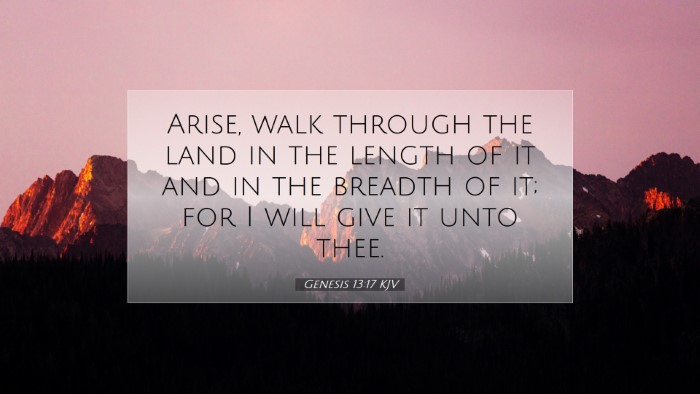Commentary on Genesis 13:17
Genesis 13:17 states:
"Arise, walk through the land in the length of it and in the breadth of it; for I will give it unto thee."
Contextual Analysis
The context of this verse emerges from the unfolding narrative of Abram (later Abraham) and Lot. Following a period of strife between their herdsmen due to an abundance of livestock, Abram separates from Lot to maintain peace. The Lord's instruction to Abram in verse 17 comes after the land has been visually surveyed and the choice has been made. It marks a significant moment as God reaffirms His promise regarding the land.
Divine Assurance and Promised Inheritance
Matthew Henry emphasizes this as an invitation to faith, wherein the Lord instructs Abram to "arise" and possess the land that has been promised. This directive is not merely an encouragement to physically traverse the land, but also a call to understand the scope of God's promise. Walking through the land symbolizes a deeper engagement with the inheritance that God has bestowed.
Albert Barnes notes that the phrase "for I will give it unto thee" underscores the certainty of God's promises. It reflects the principle that while many struggles may arise, the ultimate outcome is assured by divine decree. This promise is not only tangible but also signifies a spiritual legacy for future generations.
Spiritual Implications and Exegesis
Adam Clarke draws out the implication that Abram’s experience reflects that of the believer. The act of walking signifies active participation in God's promises. Abram's journey to survey the land represents the often necessary steps of faith that believers must undertake to truly claim what has been assured to them. Clarke further elaborates that this journey is representative of the spiritual expedition each believer must embark upon to claim their inheritance in Christ.
The walking through the land can also be interpreted as a metaphor for exploring and inhabiting the promises of God. It encourages a proactive approach to faith, urging believers to engage actively with God’s provisions rather than passively awaiting them.
Theological Reflections
This verse invites deeper theological reflection on stewardship and divine promise. Henry highlights that the command for Abram to walk implies responsibility. With God’s promises comes the obligation to steward the gifts granted fully. God's promise of land is a reminder of the earthly blessings He bestows but also a precursor to spiritual truths about the kingdom of God.
Lessons for Believers
- Faith Requires Action: As noted by Clarke, the divine command to "arise" signifies that faith is not static; believers are to act upon God's promises.
- God's Promises Are Certain: Barnes’ reflections remind us that what God has promised will come to fruition, despite present circumstances.
- Engagement with God's Word: Abram's journey through the land signifies an ongoing relationship with God's revelation and trust in His word.
Conclusion: Walking in Promises
In summary, Genesis 13:17 serves as a powerful reminder of God’s assurance of His promises in our lives. The call to "arise" and "walk through the land" is more than an instruction; it is an invitation into a deeper relationship with God, where faith and action converge. For pastors, students, theologians, and Bible scholars, this passage invites ongoing exploration and reflection on the nature of divine promises and the believer's faithful response.


